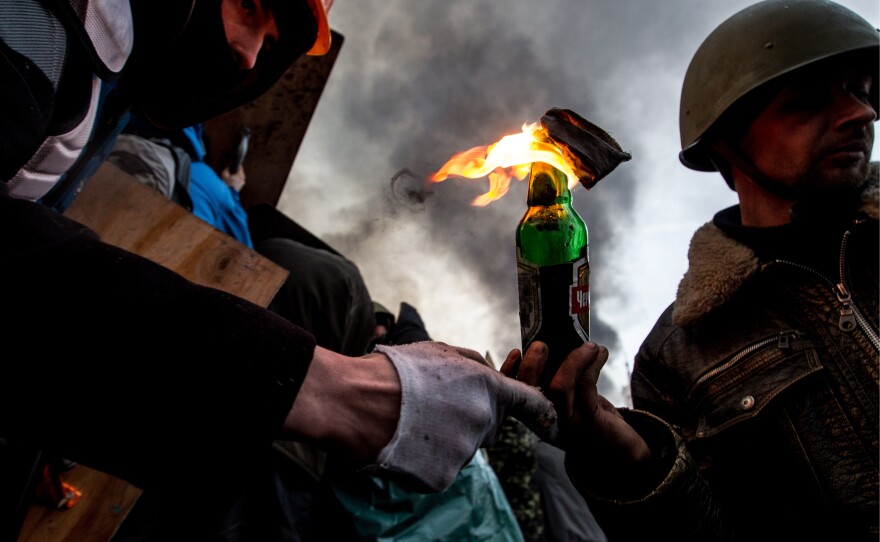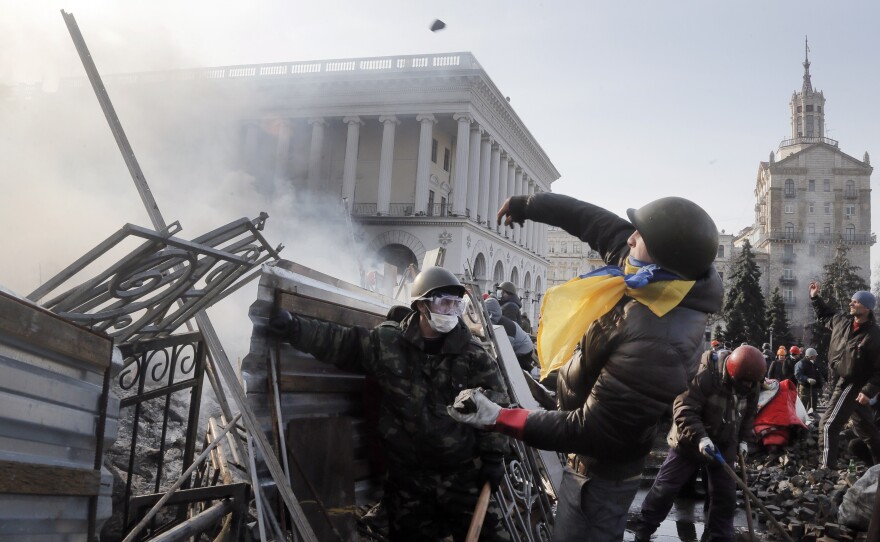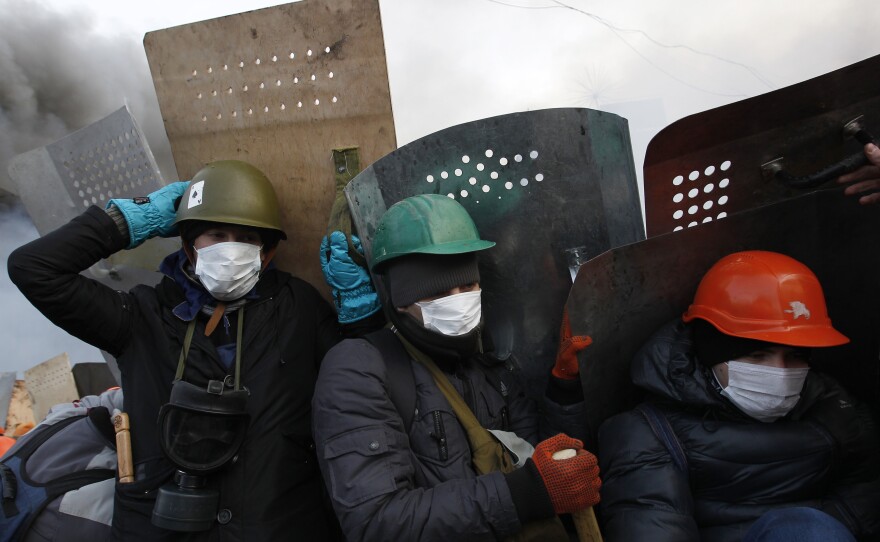This post was updated at 10:15 p.m. ET
The U.S. and the European Union are closely watching Ukraine amid news that the government was starting negotiations with opposition leaders to end the violence, which has left more than two dozen people dead since Tuesday.
A statement on the Ukrainian presidential website said:
"President of Ukraine Viktor Yanukovych held a meeting with Chairman of the Verkhovna Rada of Ukraine Volodymyr Rybak and members of the Working Group on the Settlement of Political Crisis.
"The meeting was attended by Head of the Presidential Administration of Ukraine Andriy Kliuyev, First Deputy Head of the Presidential Administration of Ukraine Andriy Portnov, Acting Minister of Justice Olena Lukash and leaders of opposition parties Arseniy Yatsenyuk, Vitali Klitschko, Oleh Tiahnybok.
"Following the meeting, the parties declared:
"1. Truce
"2. Beginning of negotiations aimed at cessation of bloodshed and stabilization of the situation in the country for the sake of civil peace."
It's still unclear what the statement means. But Yatsenyuk, one of the opposition leaders who met with Yanukovych on Wednesday, said in a statement on his Batkivshchyna (Fatherland) party's website: "The storming of the Maidan which the authorities had planned today will not take place."
Maidan is the local name for Independence Square.
Yatsenyuk added: "A truce has been declared. The main thing is to protect human life." The translation was provided by Reuters.
And the AP adds:
"[O]ne of the protest leaders, Vitali Klitschko, was quoted by the Interfax news agency as saying after the meeting that Yanukovych had ensured them there would be no attempt to storm the protesters' encampment on the main square of downtown Kiev."
The development comes amid the worst violence to hit Ukraine since protests began last November, and on the eve of a visit by the foreign ministers of France, Germany and Poland. The international community on Wednesday urged restraint and threatened sanctions against those responsible for the violence.
In response to word of negotiations, President Obama said he hoped the move would "provide space for the sides to resolve their disagreements peacefully," according to The Associated Press. But, the AP reports, Obama also said he was monitoring the violence "very carefully."
As we wrote Tuesday, "at issue is Ukraine's future direction. Late last year, Yanukovych rejected a trade deal with the European Union in favor of closer ties with Moscow, leading to protests against his government."
Earlier in the day, the prospect of even a pause in the violence seemed unlikely.
Maria Danilova, a reporter for the AP in Kiev, told NPR's Audie Cornish that radical protesters confronted police Wednesday while more moderate protesters rallied and listened to speakers.
But, she said, she also saw young girls prepare Molotov cocktails and elderly women making stones and rocks to throw at the police. Kiev residents, Danilova said, were bringing food and medicine to the protesters.
"We're seeing an organized effort to keep up this protest," she said on Wednesday's All Things Considered.
Kiev's streets were littered with rocks, bricks, spent stun grenades and tear gas canisters, rubber bullets and burning tires — debris from Tuesday's deadly clashes between police and some of the thousands of anti-government protesters. At least 26 people were killed Tuesday and an additional 241 were injured, according to The Associated Press.
Before his announcement late Wednesday, Yanukovych blamed opposition leaders for the deadly violence, saying they "crossed a line when they called people to arms." He also accused them of trying "to seize power by resorting to pogroms, arsons and murders."
Earlier Wednesday, several thousand riot police tried to storm the burning barricades of the protesters' tent camp in Independence Square, the Los Angeles Times reports.
"Police shot tear gas, stun grenades and rubber bullets at the protesters, who responded in kind by hurling cobblestones and Molotov cocktails at police," the newspaper said. "Police also used powerful water cannons, aiming them at protesters on top of barricades. Both sides accused the other of using live ammunition."
On Morning Edition, the BBC's David Stern said the protesters' complaints now extend well beyond the rejected trade deal.
"They want a new system," he said. They see the "whole [government] structure as rotten and corrupt. ... The EU has provided a symbol for the direction that these protesters want to go."
There are fears of civil war, Stern added. Protests have spread to other cities. "We're not at that point yet," he said, but "it is a divided country."
The AP's Danilova added:
"At this point, what the protesters are asking for is for Yanukovych to resign and to hold new parliamentary and presidential elections. The opposition leaders in this protest have also been talking about a constitutional reform that would decrease presidential powers and put more powers in the hands of parliament as a way out of this crisis. [Yanukovych], however, is determined to fight to the end."
The international community continued to weigh in, as NPR's Michele Kelemen reported.
President Obama, speaking in Mexico, warned of "consequences" for Ukraine if the violence doesn't stop.
The AP adds:
"In Washington, Vice President Joe Biden expressed his 'grave concern' in a telephone call to Yanukovych, urging him to pull back government forces and exercise maximum restraint. The White House said Biden also called on Ukraine's government to address the protesters' 'legitimate grievances' and put forward proposals for political reform.
"Earlier, U.S. Secretary of State John Kerry urged both sides to end the violence, halt their ultimatums and hold high-level talks."
Russian Foreign Ministry official Aleksandr Lukashevich, meanwhile, condemned what he sees as U.S. interference in Ukraine's affairs.
Foreign ministers from the EU nations planned to meet Thursday in Brussels and consider sanctions that could include "travel bans targeting the Ukrainian leadership and asset freezes," the AP says.
Copyright 2021 NPR. To see more, visit https://www.npr.org.













